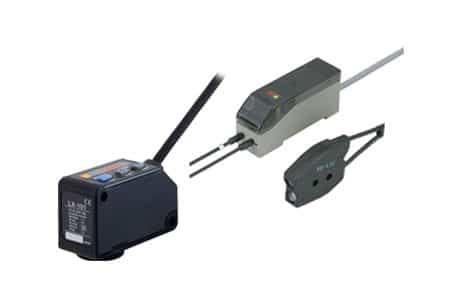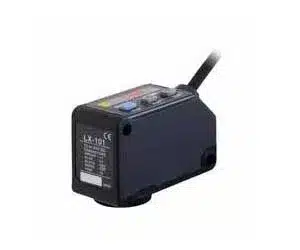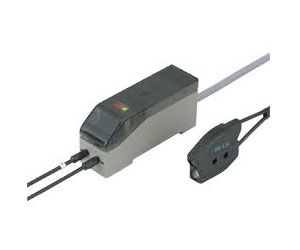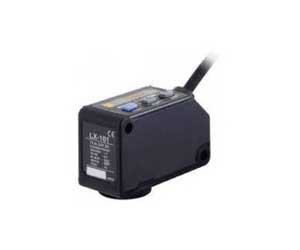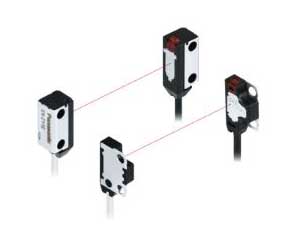Panasonic Color Sensor: Color Mark Sensors
IndMALL Automation offers a wide range of Panasonic color sensors. Our products include Panasonic colour recognition sensors, which can detect different colors mode in various lighting conditions. Color mark sensors are designed to detect specific colored marks on a product. Our color mark sensors are compact, easy to use, and offer precise color detection.
Panasonic offers a range of Panasonic Color Mark Sensors at affordable prices throughout India, including Coimbatore, Chennai, Hyderabad, Bangalore, Pondicherry, and more.
Panasonic Color Sensor: LX-100 Series
- LEDs: Red, Green, Blue.
- Optical System: Coaxial Reflective.
- A/D Converter: 12-Bit; Display: 4-Digit LED.
- Teach-In: Simple with external option.
- Timer: ON/OFF-Delay; Outputs: Two inverse (cable type).
- Size: Compact, M12 or cable type.
- Sensing Range: 10 ± 3 mm; Voltage: 12 to 24 V DC.
- Response Time: 45 µs (mark mode), 150 µs (color mode).
Panasonic Color Mark Sensors FZ-10
- LEDs: Red, Green, Blue.
- Response Time: 1ms; Teach-In Button: For easy sensor adjustment.
- Tolerance Adjuster: 16-step.
- Construction: Miniature; Ambient Light Immunity: High.
- Sensor Life: Long; Timer Function: Included.
- Sensing Range: Various, with fibers from 1 to 8mm spot diameters.
Product List:
| Model No | Image | Spot Size | Sensing Range | Supply Voltage | Output | Digital Display |
|---|---|---|---|---|---|---|
| LX-101 | 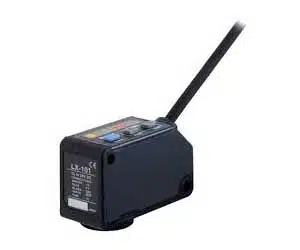 |
1 x 5 mm 0.039 x 0.197 | 10 ± 3 mm 0.394 ± 0.118 in | 12 to 24 V DC ± 10 % Ripple P-P 10 % or less | NPN | 4-digit red LED display |
| LX-101-P | 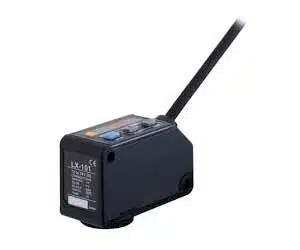 |
1 x 5 mm 0.039 x 0.197 | 10 ± 3 mm 0.394 ± 0.118 in | 12 to 24 V DC ± 10 % Ripple P-P 10 % or less | PNP | 4-digit red LED display |
| LX-101-P-Z | 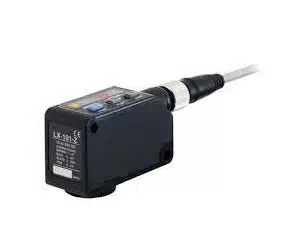 |
1 x 5 mm 0.039 x 0.197 | 10 ± 3 mm 0.394 ± 0.118 in | 12 to 24 V DC ± 10 % Ripple P-P 10 % or less | PNP | 4-digit red LED display |
| LX-101-Z | 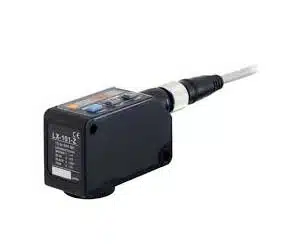 |
1 x 5 mm 0.039 x 0.197 | 10 ± 3 mm 0.394 ± 0.118 in | 12 to 24 V DC ± 10 % Ripple P-P 10 % or less | NPN | 4-digit red LED display |
Frequently Asked Questions
What is Colour Mark Sensor?
They help in precise and quick operations. In short, a color mark sensor “sees” colors and helps machines work accurately.
How Does a Color Sensor Work?
A color sensor is like a tiny camera. It detects colors in objects. How? By using light. The sensor shines light on an object. Then, it measures the reflected light. Different colors reflect light differently. The sensor reads these differences. After reading, it identifies the color.
Here we can take example a red apple reflects more red light. So, the sensor knows it’s red. In a nutshell, color sensors use light to spot and name colors. They help machines “see” and respond to colors.
What is the Range of Color Sensors?
Color sensors can detect many colors. Their range varies by model and type. Some sense basic colors like red, blue, and green. Others can spot a wide range of shades. The range depends on the sensor’s design. Better sensors can identify more colors accurately.
So, before buying, always check the sensor’s range. It tells you how many colors it can detect. In short, color sensors can “see” from a few to many colors. The exact number depends on the sensor.
What are the Main Parts of a Color Sensor?
A color sensor has key parts. First, there’s a light source, often an LED. It shines light on objects. Next, there’s a detector. It senses reflected light from the object. The detector has tiny parts called photodiodes. They capture red, green, and blue light.
Lastly, there’s a circuit. It processes the captured light information. In short, a color sensor has a light, detector, and circuit. Together, they identify colors.
Get the best price for Panasonic Color Sensors.

